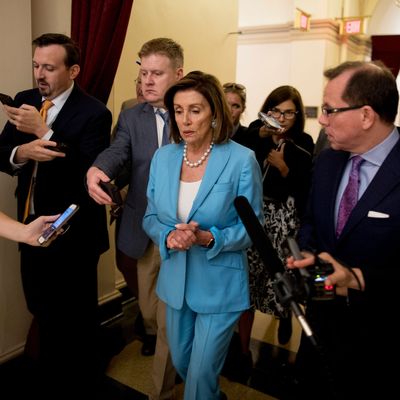
Alexander Acosta is running out of friends. His work as secretary of Labor is haunted by his former life as a U.S. Attorney and by the leniency he once showed billionaire sexual predator Jeffrey Epstein. With Epstein facing a new round of charges, Acosta is more reliant than ever on the goodwill of Donald Trump. But Trump, though he defended Acosta on Tuesday, may be out of patience with the secretary for reasons that have little to do with his moral and professional failings in his former job. A report in Bloomberg suggests that Acosta has alienated Trump, who believes the secretary has not pursued deregulation with due vigor.
Acosta, with his baggage from the past and struggles in the present, is both an appropriate and easy target for House Democrats. Or he would be, if Democrats actually wanted to fully exercise their oversight authority. But that outcome looked distant on Tuesday. Though she’s called on Acosta to resign, Speaker Nancy Pelosi seemed to dismiss the possibility of impeaching him:
On Wednesday, House Oversight Committee chairman Elijah Cummings announced that Democrats would investigate Acosta’s conduct in the Epstein case. But if Pelosi truly does oppose impeachment, the investigation could find itself at a dead end. Her intransigence does encourage some unsavory speculation: that Pelosi might want to protect prominent Democrats. Before he went to jail in 2008, Epstein was friendly with powerful members of both parties, including former president Bill Clinton. But there’s no evidence that Clinton abused underage girls while in Epstein’s company, and right now, the federal case in New York against Epstein seems focused on Epstein alone. Her evident willingness to allow a wide-ranging investigation suggests she’s not afraid of what supervisorial spadework might turn up. But there’s a likelier explanation for Pelosi ruling out, even prior to an investigation, impeaching Acosta. She’s clinging to an outdated view of the world, which makes her unfit for the challenges of the moment. Pelosi is willing to confront Trump, or his officials, but only to a point. She not only believes the center will hold; she seems to think that it will, once some unspecified red line is crossed, topple Trump and his administration without any direct intervention on her part.
The horrors of the Trump presidency are legion. Children die in camps at the border; on Tuesday evening, NBC reported that children in an Arizona camp had been sexually abused. Vital support services for the poor are at risk. The president himself is corrupt, and violent, according to the 24 women who have accused him of sexual assault. White-supremacist violence is increasing, which experts credit to Trump’s anti-immigrant nationalism, and the administration seems determined to provoke some kind of conflict with Iran. A credible political party would have plenty of fodder for a coherent opposition narrative. But if Pelosi wants to be the opposition, it doesn’t show. She behaves as if confrontation, or intervention, will cost her party the bit of power it holds.
Pelosi’s reluctance to investigate Acosta is part of a pattern. She’ll criticize, call on someone to resign, or even permit an investigation, but impeachment is too far. Trump, she said in May, is becoming “self-impeachable,” a nonsensical phrase that absolves her of any responsibility to act. In June, she refused to even censure the president, telling the press that “if the goods are there, you must impeach.” For Pelosi, it seems to be impeachment or nothing, and so far, she’s chosen nothing. Meanwhile, she’s jabbed repeatedly at left-wing policies and progressive members of her own party. The Green New Deal, to Pelosi, isn’t a promising proposal to address a pressing existential crisis; it’s “the green dream or whatever.” When she speaks of the party’s left-wing, four-woman freshman “squad,” Pelosi can sound distinctly sour. “All these people have their public whatever and their Twitter world,” she told New York Times columnist Maureen Dowd, after Ilhan Omar, Alexandria Ocasio-Cortez, Ayanna Pressley and Rashida Tlaib voted against a humanitarian bill that included funding for Immigration and Customs Enforcement and Customs and Border Protection. “But they didn’t have any following. They’re four people, and that’s how many votes they got.”
Pelosi’s job, as Speaker in a time during which her party does not control the Senate or the White House, is to protect a Democratic majority in the House. She’s also responsible for helping maximize her party’s chances of defeating Trump. The only legible explanation for her reluctance to investigate Acosta, or censure Trump, is that she fears a backlash that would cost her moderate members their seats. But if that’s the case, she overestimates the risk. Trump is an unpopular president, and the disgraceful events of his tenure mobilized voters and flipped House districts. The forces that elevated insurgents like Ocasio-Cortez, and moderates like Virginia’s Abigail Spanberger, have shared roots: Voters reacted against Trump and demanded change. Now Pelosi seems to believe that she can simply ride 2018’s blue wave through the general election, but there may be consequences to that reticence that she does not expect. If she wants to keep her majority, she has to give people a reason to back her party — and that takes more than passing bills that go to the Senate to die. She has to give voters something to believe in, too. Why should voters give Democrats power they won’t use?
The times demand a more aggressive Democratic Party. Acosta stands accused of violating federal law to give an unrepentant sexual predator a light sentence. If Pelosi won’t even consider his impeachment, then she is complicit in the same culture of impunity allows Trump to prosper.






























